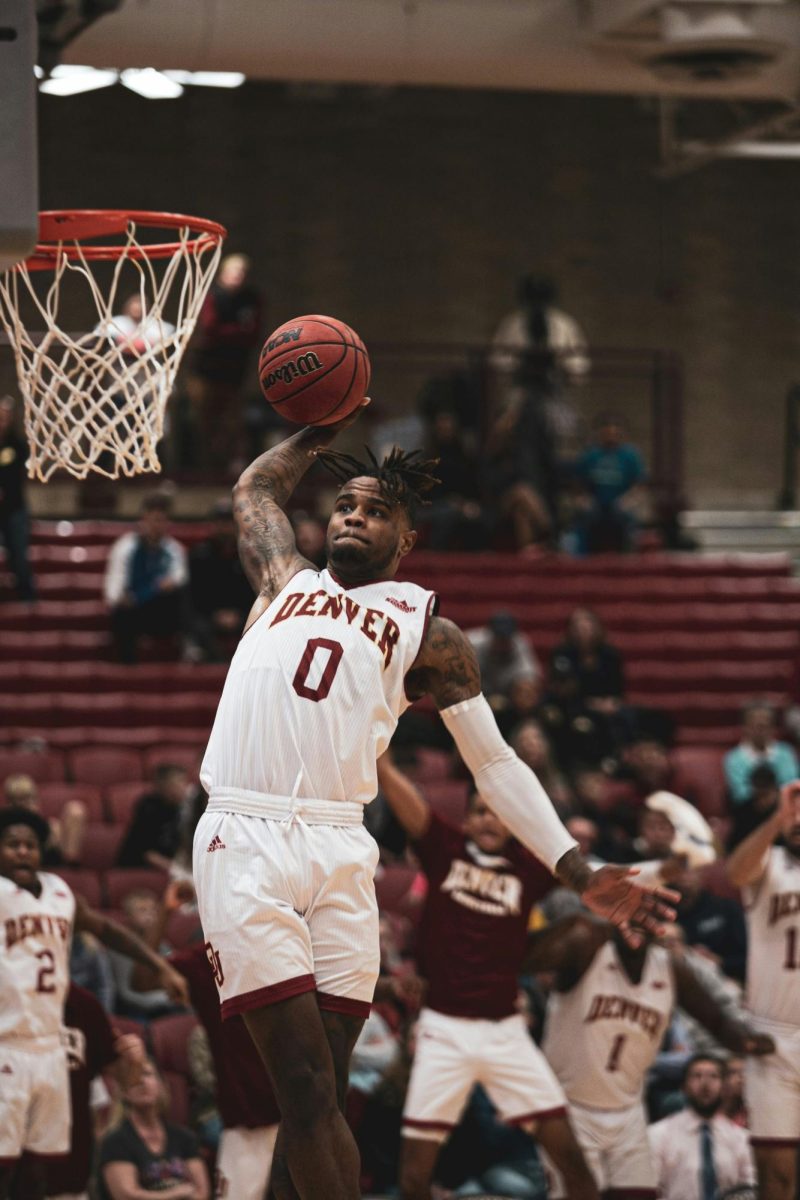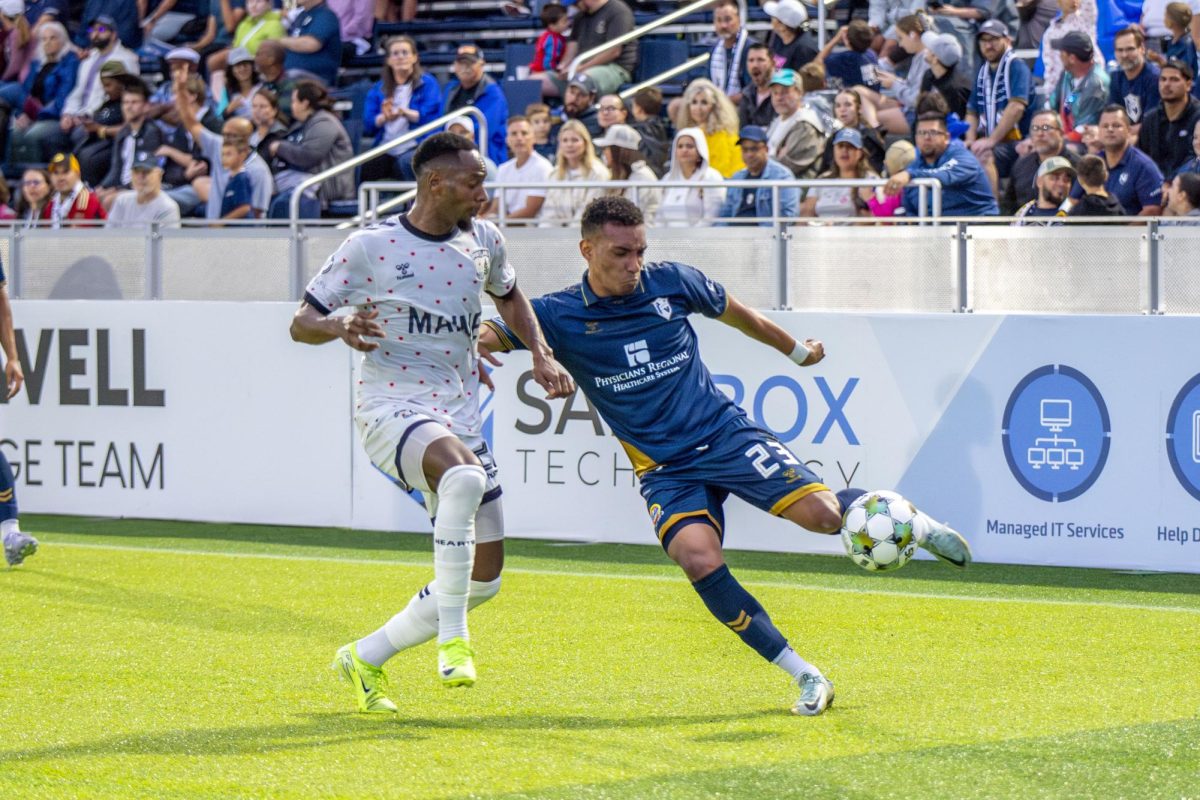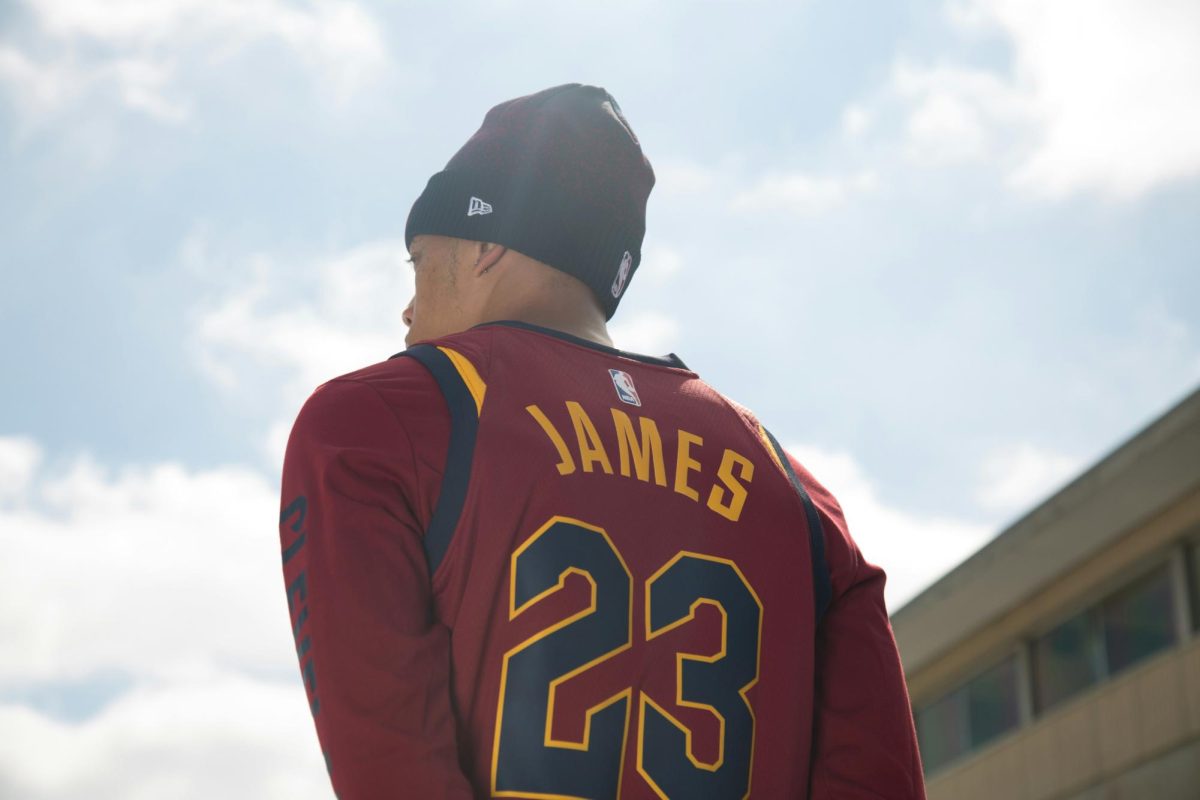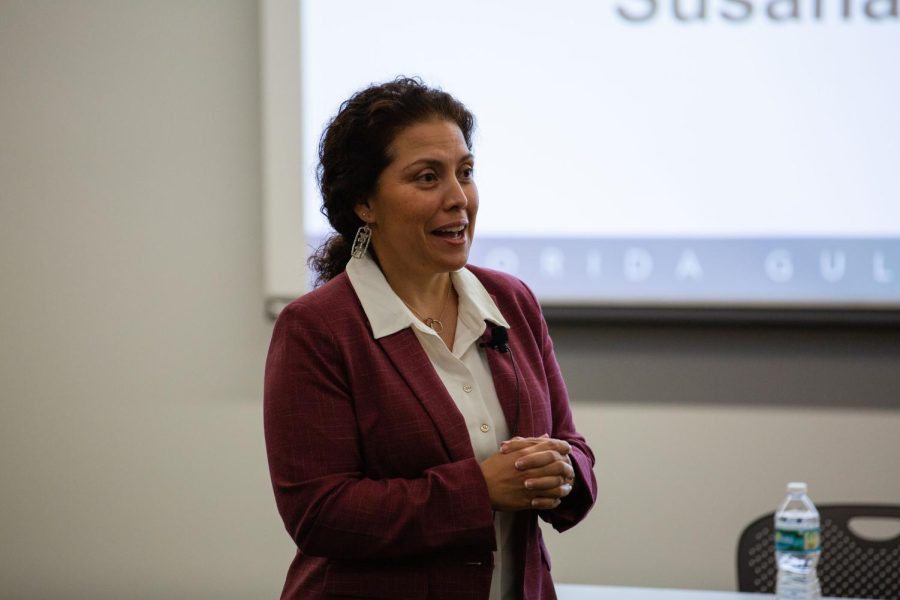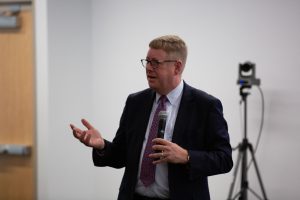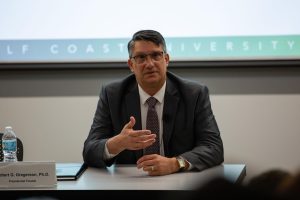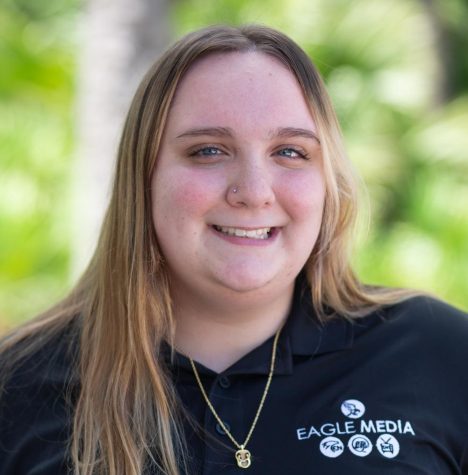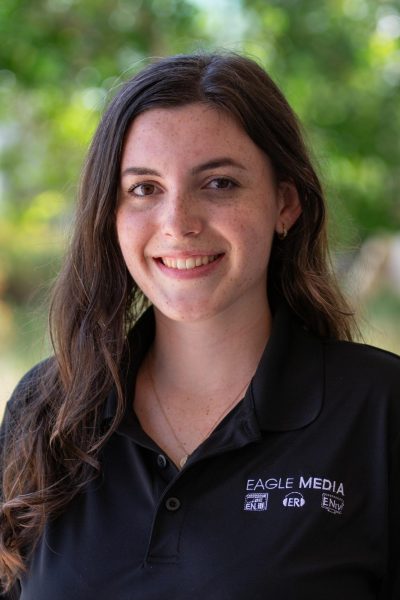Presidential Finalist Susana Rivera-Mills Acknowledges the Future of FGCU
Presidential Search Finalist Susana Rivera-Mills answers faculty’s questions at the first presidential forum.
November 1, 2022
Dr. Susana Rivera-Mills attended three public forums held in the Water School on Nov. 1 to give faculty and staff insight into what she’s able to bring to FGCU as a presidential finalist.
She is the last of three finalists to attend public forums for the fifth presidency. Dr. Robert Gregerson and Dr. Tod Laursen are the other finalists in the mix and attended their public forums prior.
Aisha Lewis, the president of the Staff Advisory Council and vice president of the Black Faculty and Staff Association, moderated the 8:30 a.m. to 9:30 a.m. public forum. Rivera-Mills began the forum by sharing how she felt while flying into Fort Myers and seeing the damage from Hurricane Ian. She talked about FGCU’s purpose, values, youth, innovation and community engagement, all of which attracted her to apply for the president’s position.
“I see that as part of who you are and what you do, I think that there’s a really strong alignment there. I’m a first-generation college student and as such, I have seen my own life and the life of my family transformed through education,” Rivera-Mills said. “I’m passionate about being able to give that same opportunity to everybody.”
Travell “T.O.” Oakes, the assistant director of Multicultural Development initiatives, asked what she has done in past positions to ensure that marginalized community members can be involved in and feel safe in the community.
Rivera-Mills said she’s helped bring programs to multiple institutions focused on undergraduate research.
“We were able to actually make sure that we were bringing these programs to incoming first-year students. There are many programs with high-impact practices that don’t start until the junior or senior year. And by then we’ve lost a lot of students, particularly underrepresented students,” Rivera-Mills said.
She said it’s important that underrepresented students build connections quickly through high-impact practice, such as research. She believes mentoring and success coaching is an important way to guide students through complicated university systems.
“The programs that I was able to start… actually showed that not only were we able to eliminate any opportunity gaps between groups through these high-impact practices, but those who participated in these practices had a retention rate of 95 percent,” Rivera-Mills said.
The next question was submitted online, asking Rivera-Mills to describe what would be her approach and priorities moving into the next strategic plan.
She believes the process of strategic planning is almost more important than the outcome of it because it created a united vision, shared set of goals, common language and shared values. She believes strategic plans shouldn’t be over complicated and there should be short-term, mid-term and long-term goals.
“At Ball State… Our strategic plan has five goals. And what I love about that is that I can walk across campus, in any department, chair, faculty, dean, anyone, our students, I can talk about goal two and they know exactly what I’m talking about. I can talk about goal five, they know what I’m talking about. And then we have a set of executive dashboards and metrics that really keeps track of how is it that we are moving these things forward,” Rivera-Mills said.
Another question from the live stream was announced, asking Rivera-Mills about surveys that determine what issues colleges and presidents are most concerned about, and to share her perspective on the results found over the last several years and how to respond to these concerns.
Rivera-Mills referenced multiple surveys, including from the Chronicle of Higher Education, ACE and APLU, that collect this data. She said one of the top concerns is enrollment, as national enrollment trends are declining as the population is growing. The second is financial sustainability for institutions and how to keep education affordable for students.
“That’s where you’re different, your tuition has actually declined over the last few years, which is amazing. I have heard of institutions that have been able to keep their tuition flat, but not declining, actually making it more affordable for your students and your learners,” Rivera-Mills said.
She said other concerns were data analysis and prioritizing resources, the rising cost and constant evolution of technology, and philanthropy.
Dr. Chris Blakely, the assistant vice president for Campus Life and dean of students and the president of the Black Faculty Staff Association, asked about her experiences regarding trauma-informed care as well as the impacts to employee morale, referencing Hurricane Ian and the pandemic.
Rivera-Mills shared that wellness programs were created for faculty and staff after COVID-19’s isolation as well as mental health workshops one-on-one.
“I firmly believe that you cannot give what you don’t have. And what I mean by that is we can’t care for each other if we are not caring for ourselves,” Rivera-Mills said.
She believes trauma takes time to process and that compassion and empathy must be shown towards each other.
“I have personally gone through a number of very challenging things in my life…I’m originally from El Salvador and my family went through the Civil War, which is the reason that my parents and my siblings and I emigrated to California,” Rivera-Mills said. “None of us spoke English. You’re forced to constantly reinvent yourself, you have to adapt, you have to adjust, you have to reinvent, you have to figure out how to get up, you have to develop a level of resilience that goes beyond what you would think you have to dig very deeply to find your why.”
She said that as president, one of her roles would be to remind the community of their “why.”
“Why is it that we’re here? Why is it that we need to do what we need to do? How do we align that to our mission?” Rivera-Mills said.
Lisa Johnson, the associate vice president for enrollment management, asked how she assessed the academic structure of Ball State University when starting as provost to ensure faculty, staff and student success.
Rivera-Mills said the first thing she did as provost was go on a deep listening tour through all academic departments.
“I asked three very simple questions,” Rivera-Mills said. “I said, tell me what you love about this institution, what is working well, and what you don’t want to see change? And then tell me those things that you think we could be doing better, things that may even be obstacles and intended barriers that we may not be aware of? And then the third question was tell me how you would change things so that you can actually do your work better from where you sit?”
From the information she gathered, she considered the strategic planning and mission and identity of the institution to think about how to effectively and efficiently use the human resources and financial resources.
“I am a strong believer of promoting leadership and I don’t think leadership has anything to do with titles or positions. I think titles and positions simply give us a platform from which we can expand our influence and that platform will either serve to highlight things, or it will highlight negative things. It’s still a platform. But I think leadership is really more about an attitude. It’s a way of approaching your work. And as such, I think people need to lead from where they are in the institution, and that includes everybody, regardless of where you sit,” Rivera-Mills said.
The next online question asked what elements within the university, community, faculty senate, student government, faculty union and staff advisory council, are essential to successful shared governance with collective bargaining.
“I’m a very committed communicator, I guess I could say. I’m a linguist by training,” Rivera-Mills said.
Rivera-Mills believes listening, sharing and working together are important in a university. She said it’s also important to know that there will be times of disagreement and unity needs to remain.
Ashleigh Droz, the director of the Office of Internships and Cooperative Programs, asked her to expand on her philosophy for student learning and development outside of the classroom through experiential learning and career readiness initiatives.
Rivera-Mills said she’s passionate about community engagement. She worked to create partnerships across Indiana and provide paid internships to students.
“Because some of them do cost money, we have to pay attention to equity and that people have access to some grants or some funding so that they can do that,” Rivera-Mills said.
She explained a program at her current university called immersive learning, which intersects faculty research, community need and student learning.
“It can be incredibly powerful. It’s a very intense way deep way of learning as well,” Rivera-Mills said.
She supports study abroad and study away programs, as well as giving students the opportunity to explore careers before they are juniors and seniors.
She talked about Skills Infusion, a program that combines career exploration and transferable skills into the curriculum.
Troy Bolivar, the director of Military and Veteran success, asked what veteran programs and services look like at her past institutions.
“My current institution is not located in a place where we have a high population of veterans. However, I can tell you that our online programs have been ranked as the most veteran-friendly programs in terms of accessibility, being able to easily onboard veterans and meet their needs and make sure that we guide them in whatever way they need,” Rivera-Mills said.
She said that veterans globally engage in those programs. She explained that when she worked in Oregon, that university was a land-grant university that had more veteran programs with all branches of ROTC on campus.
“I think it depends a little bit on the population and whether you can create that sense of cohort. I think that’s probably one of the most powerful ways to connect and to ensure that products that the programs that we offer are flexible and accessible to the needs of the population,” Rivera-Mills said.
Dr. Charles Gunnels, chair of Biological Sciences, asked how she would help facilitate youth culture on a campus where older generations live in this region.
Rivera-Mills said that one program that her university is passionate about is mentoring, where every student has at least one mentor, many of that are alumni.
“I was incredibly fortunate to be raised in a multi-generational household. So, I benefited for several years before we moved from having my grandfather lived with us at home. And I think that there are just amazing benefits to that intergenerational interaction,” Rivera-Mills said.
She said both sides will have to be educated.
“It’s going to be about letting our young people know, the amazing resources that they have around them with people who have experienced people who have met lives, people who can offer opportunities, who can connect them to include and sponsor them in different ways,” Rivera-Mills said. “And then it’s also going to take some education of the population around us to also understand the huge opportunity that they have if they can engage with us in meaningful ways because that will benefit the region as a whole.”
An online question asked about her interest, experience and strategy for growing FGCU’s research and scholar productivity.
Rivera-Mills said Ball State has an office dedicated to sponsored programs that always look for opportunities for grants and funding.
“I can tell you that over the last four years, with my team, we’ve been able to build the largest open portfolio in research in Ball State history,” she said. “… it involves creating relationships with those foundations. There are industry partners who are corporations that are interested in funding different projects in different ways so it’s about really being proactive, understanding and assessing the expertise that’s available at the institution, forming teams, creating a communication plan so that people can look to know, here’s going to be a list of opportunities that we need to keep an eye on, and then building those external relationships so that people know who we are and what we’re interested in so that there’s alignment for funding.”
The next question asked what her peers say her strengths are. She describes herself as warmly demanding, a phrase she inherited from her students.
“I have high expectations, I like to challenge people to think about doing things differently, to think outside the box,” Rivera-Mills said. “… but I will support you with what you need to do. I don’t think that I can ask an individual to do something and then go figure out how to do it on your own. I think that we need to have the support structure in place to ensure that they can actually succeed at what we’re asking them to do.”
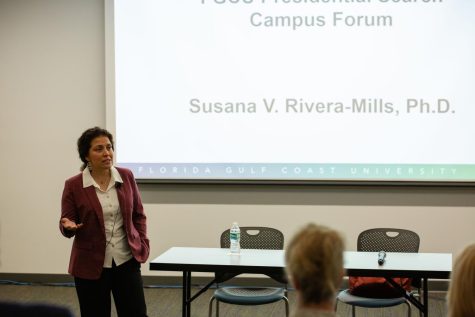
Jaime Weisinger, a part of the advisory committee for agribusiness, asked if Rivera-Mills has a plan to suggest the agribusiness industry in Southwest Florida.
“What I would like to do is actually come in and meet with the individuals that are involved, both externally and internally and learn: what are we doing what is needed, what is expected, really create strong partnerships or strengthen existing partnerships, and find out how we can continue to deliver on what it is that we need to deliver, …and how do we create those pathways in that pipeline to ensure that it’s happening,” Rivera-Mills said.
She said partnering around innovation and receiving grants could help the program grow.
Dr. Jaffar Ali Shahul Hameed, a mathematics professor, asked how Rivera-Mills views FGCU as a growing undergraduate institution and academic freedom in regard to the recent Florida legislative change.
She explained how her current university evaluates the data of the current programs and what programs are demanded.
“You don’t want to over-expand yourself, and the other thing that I think has been a challenge for all institutions in higher education, is we’re very good at expanding, we’re not very good at stopping doing things that we should stop doing. And so that’s why the assessment piece is so critical, right?” Rivera-Mills said.
To answer Dr. Hameed’s next question, she said that education is founded on freedom of speech in academics.
“I can’t imagine doing the innovative things that we need to be doing in our world today without the diverse perspectives, diverse voices, having civil debates,” she said. “… we’re going to have to be okay disagreeing on [things] and walk out the door together, somehow. And there are a lot of tools that I think can be brought to campus, if you’re not here already, that would support that.”
The final question was submitted online, asking Rivera-Mills thoughts on community outreach, commitment to community outreach, and nurturing those relationships.
“A long time ago, I went through an extensive training program about community-engaged research. Community-engaged research and scholarship is a field that I think I wish were more visible. I wish more people had gone to that training, because it really unpacks how that work should be done with community, not to community, with community,” Rivera-Mills said.
She explained the criteria that were included in the program.
“It includes a range of criteria around you know, how are we mutually beneficial? How do we listen to each other? How do we respect the different sources of knowledge? How do we acknowledge the fact that not just academic knowledge is valuable, but that our communities contribute greatly to the knowledge that we’re trying to develop and disseminate as well?” Rivera-Mills said.
She said that she’s committed to that and would love to learn more about what FGCU is doing in that area and bring some of this knowledge to the university.








